Understanding-public-policy-理解公共政策(英文版带翻译)
公共政策导论讲义
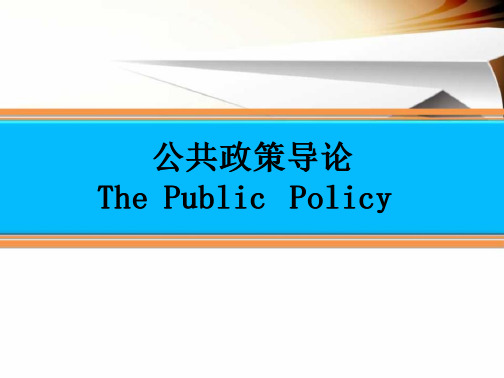
第一节 公共政策的内涵与特征
二、公共政策的基本特征 (一)公共性与层次性 •公共性:公共政策是公共权力机关为解决公共问 题进行社会公共管理,维护社会公正,实现公众利 益,确保社会稳定与发展的措施和手段。因此,公 共政策必须立足于整个社会发展,从全社会绝大多 数人的利益出发来制定和实施各种行为准则,这就 是它的公共性。
第一节 公共政策的内涵与特征
(二)合法性与权威性 •合法性:从广义角度而言,公共政策的合法性主 要是指公众对其的认可和接受程度。公共政策要具 有合法性就必须经过一个合法化的过程,这个过程 可以分为两个部分,第一部分是政治系统的合法化, 第二部分是公共政策的合法化。
第一节 公共政策的内涵与特征
(二)合法性与权威性 •权威性:公共政策的权威性是指政治系统的输出 在一定的范围内成为起支配作用的意志,他人愿意 服从或者不得不服从。政策的权威性又是和强制性 并存的,权威性的政策要求所有社会公众都要遵守, 一视同仁,违背它就要受到相应的惩罚。
第一节 公共政策的内涵与特征
·4.公共问题 · 公共问题(Public Problem)是指具有广泛影响, 且影响程度较大,人们必须认真对待的社会问题, 是包含于社会问题之中、与私人问题相对应的特殊 范畴。 · 政府要管具有公共性质的问题,而尽量不要去干 涉私人性质的问题。
第一节 公共政策的内涵与特征
公共政策导论 The Public Policy
• 经济建设、政治建设、文化建设、社会建设、生态文明建 设“五位一体”。
• 全面建成小康社会。 • 经济持续健康发展。 • 到2020年“实现国内生产总值和城乡居民人均收入比2010
年翻一番”。居民收入增长和经济发展同步、劳动报酬增 长和劳动生产率提高同步。 • 工业化、信息化、城镇化、农业现代化同步发展。 • 社会主义生态文明新时代。
英语作文公共知情权
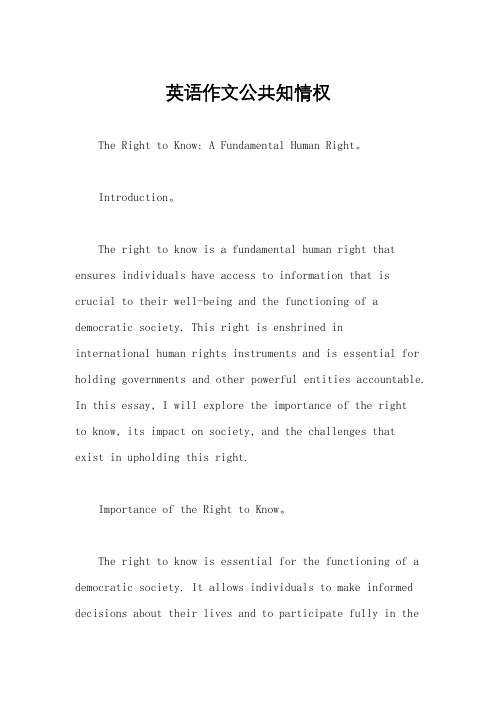
英语作文公共知情权The Right to Know: A Fundamental Human Right。
Introduction。
The right to know is a fundamental human right that ensures individuals have access to information that is crucial to their well-being and the functioning of a democratic society. This right is enshrined ininternational human rights instruments and is essential for holding governments and other powerful entities accountable. In this essay, I will explore the importance of the rightto know, its impact on society, and the challenges thatexist in upholding this right.Importance of the Right to Know。
The right to know is essential for the functioning of a democratic society. It allows individuals to make informed decisions about their lives and to participate fully in thedemocratic process. Without access to information, citizens cannot hold their governments accountable or make informed choices about their leaders and policies. The right to know also plays a crucial role in promoting transparency and preventing corruption. When information is freely available, it becomes more difficult for those in power to abuse their authority or engage in unethical behavior.Furthermore, the right to know is essential for protecting individual rights and freedoms. Access to information is crucial for ensuring that individuals can exercise their rights, such as the right to freedom of expression, the right to a fair trial, and the right to privacy. For example, journalists and human rightsdefenders rely on the right to know to uncover human rights abuses and hold perpetrators accountable. Without this right, individuals would be vulnerable to abuse and exploitation with no means of recourse.Impact on Society。
Understanding-public-policy-理解公共政策(英文版带翻译)
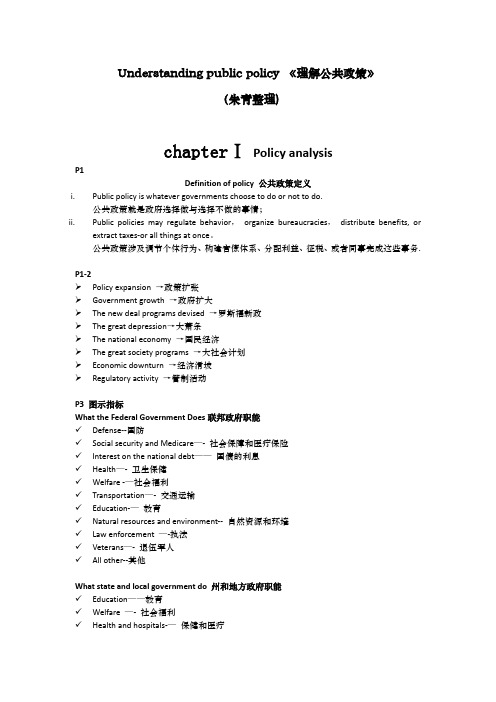
Understanding public policy 《理解公共政策》(朱青整理)chapterⅠPolicy analysisP1Definition of policy 公共政策定义i.Public policy is whatever governments choose to do or not to do.公共政策就是政府选择做与选择不做的事情;ii.Public policies may regulate behavior,organize bureaucracies,distribute benefits, or extract taxes-or all things at once。
公共政策涉及调节个体行为、构建官僚体系、分配利益、征税、或者同事完成这些事务.P1-2➢Policy expansion →政策扩张➢Government growth →政府扩大➢The new deal programs devised →罗斯福新政➢The great depression→大萧条➢The national economy →国民经济➢The great society programs →大社会计划➢Economic downturn →经济滑坡➢Regulatory activity →管制活动P3 图示指标What the Federal Government Does联邦政府职能✓Defense--国防✓Social security and Medicare—- 社会保障和医疗保险✓Interest on the national debt——国债的利息✓Health—- 卫生保健✓Welfare -—社会福利✓Transportation—- 交通运输✓Education-—教育✓Natural resources and environment-- 自然资源和环境✓Law enforcement —-执法✓Veterans—-退伍军人✓All other--其他What state and local government do 州和地方政府职能✓Education——教育✓Welfare —- 社会福利✓Health and hospitals-—保健和医疗✓Highways—- 高速公路✓Police and fire——治安和消防✓Sanitation——卫生✓Prisons -—监狱✓Natural resources and environment-—自然资源和环境✓All other ——其他P4✓Dependent variables →因变量✓The independent variables →自变量✓Determinants →决定性因素✓Policy evaluation →政策评估P6The difference between policy analysis and policy advocacy政策分析与政策倡议的差别i.Policy advocacy requires the skillsof rhetoric, persuasion,organization, and activism.政策倡议需要修辞、说服、组织与实践的技巧;ii.Policy analysis encourages scholars and students to attack critical policy issues with the tools of systematicinquiry。
Understandingpublicpolicy理解公共政策英文带翻译
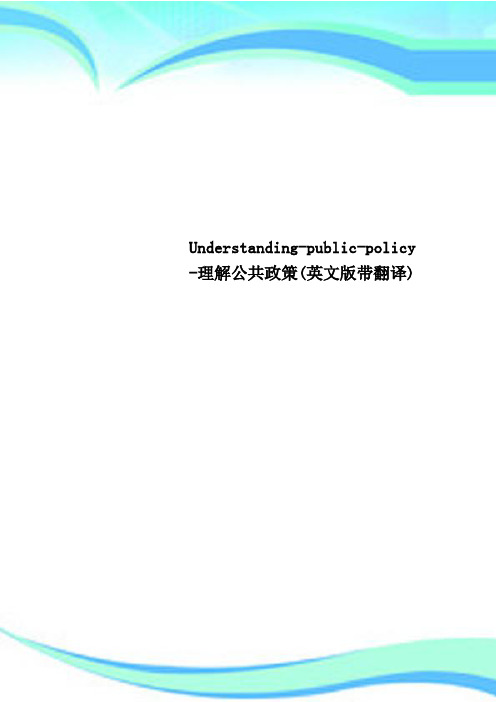
Understanding-public-policy -理解公共政策(英文版带翻译)————————————————————————————————作者:————————————————————————————————日期:Understanding public policy 《理解公共政策》(朱青整理)chapterⅠPolicy analysisP1Definition of policy 公共政策定义i.Public policy is whatever governments choose to do or not to do.公共政策就是政府选择做与选择不做的事情;ii.Public policies may regulate behavior, organize bureaucracies, distribute benefits, or extract taxes-or all things at once.公共政策涉及调节个体行为、构建官僚体系、分配利益、征税、或者同事完成这些事务。
P1-2➢Policy expansion →政策扩张➢Government growth →政府扩大➢The new deal programs devised →罗斯福新政➢The great depression→大萧条➢The national economy →国民经济➢The great society programs →大社会计划➢Economic downturn →经济滑坡➢Regulatory activity →管制活动P3 图示指标What the Federal Government Does联邦政府职能✓Defense——国防✓Social security and Medicare——社会保障和医疗保险✓Interest on the national debt——国债的利息✓Health——卫生保健✓Welfare ——社会福利✓Transportation——交通运输✓Education——教育✓Natural resources and environment——自然资源和环境✓Law enforcement ——执法✓Veterans——退伍军人✓All other——其他What state and local government do 州和地方政府职能✓Education——教育✓Welfare ——社会福利✓Health and hospitals——保健和医疗✓Highways——高速公路✓Police and fire——治安和消防✓Sanitation——卫生✓Prisons ——监狱✓Natural resources and environment——自然资源和环境✓All other ——其他P4✓Dependent variables →因变量✓The independent variables →自变量✓Determinants →决定性因素✓Policy evaluation →政策评估P6The difference between policy analysis and policy advocacy政策分析与政策倡议的差别i.Policy advocacy requires the skillsof rhetoric, persuasion, organization, and activism.政策倡议需要修辞、说服、组织与实践的技巧;ii.Policy analysis encourages scholars and students to attack critical policy issues with the tools of systematic inquiry.政策分析则鼓励学者运用系统研究的工具来探讨重要的政策问题。
公共政策
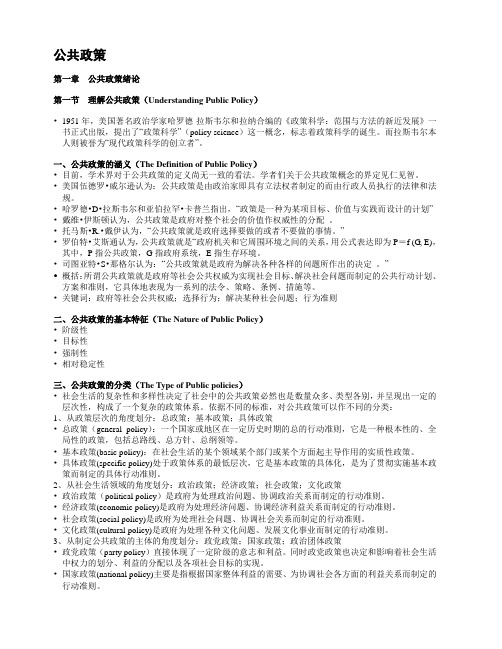
公共政策第一章公共政策绪论第一节理解公共政策(Understanding Public Policy)•1951年,美国著名政治学家哈罗德·拉斯韦尔和拉纳合编的《政策科学:范围与方法的新近发展》一书正式出版,提出了“政策科学”(policy science)这一概念,标志着政策科学的诞生。
而拉斯韦尔本人则被誉为“现代政策科学的创立者”。
一、公共政策的涵义(The Definition of Public Policy)•目前,学术界对于公共政策的定义尚无一致的看法。
学者们关于公共政策概念的界定见仁见智。
•美国伍德罗•威尔逊认为:公共政策是由政治家即具有立法权者制定的而由行政人员执行的法律和法规。
•哈罗德•D•拉斯韦尔和亚伯拉罕•卡普兰指出,“政策是一种为某项目标、价值与实践而设计的计划” •戴维•伊斯顿认为,公共政策是政府对整个社会的价值作权威性的分配。
•托马斯•R.•戴伊认为,“公共政策就是政府选择要做的或者不要做的事情。
”•罗伯特•艾斯通认为,公共政策就是“政府机关和它周围环境之间的关系,用公式表达即为P=f (G, E),其中,P指公共政策,G指政府系统,E指生存环境。
•司图亚特•S•那格尔认为:“公共政策就是政府为解决各种各样的问题所作出的决定。
”•概括:所谓公共政策就是政府等社会公共权威为实现社会目标、解决社会问题而制定的公共行动计划、方案和准则,它具体地表现为一系列的法令、策略、条例、措施等。
•关键词:政府等社会公共权威;选择行为;解决某种社会问题;行为准则二、公共政策的基本特征(The Nature of Public Policy)•阶级性•目标性•强制性•相对稳定性三、公共政策的分类(The Type of Public policies)•社会生活的复杂性和多样性决定了社会中的公共政策必然也是数量众多、类型各别,并呈现出一定的层次性,构成了一个复杂的政策体系。
依据不同的标准,对公共政策可以作不同的分类:1、从政策层次的角度划分:总政策;基本政策;具体政策•总政策(general policy):一个国家或地区在一定历史时期的总的行动准则,它是一种根本性的、全局性的政策,包括总路线、总方针、总纲领等。
公共政策与社会改革:大学生的政策思考英文演讲稿范文
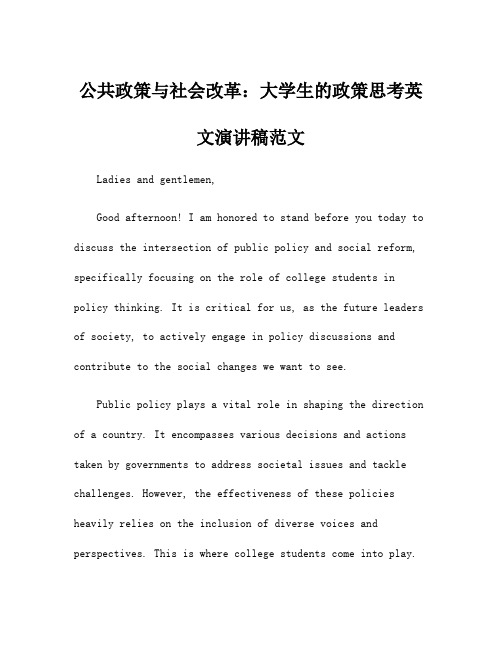
公共政策与社会改革:大学生的政策思考英文演讲稿范文Ladies and gentlemen,Good afternoon! I am honored to stand before you today to discuss the intersection of public policy and social reform, specifically focusing on the role of college students in policy thinking. It is critical for us, as the future leaders of society, to actively engage in policy discussions and contribute to the social changes we want to see.Public policy plays a vital role in shaping the direction of a country. It encompasses various decisions and actions taken by governments to address societal issues and tackle challenges. However, the effectiveness of these policies heavily relies on the inclusion of diverse voices and perspectives. This is where college students come into play.As the young, energetic minds, college students possess a unique perspective on the challenges that our society faces. They bring fresh ideas, innovative solutions, and a passionfor change. By actively participating in policy discussions, college students have the power to influence decision-makers and shape the policies that will impact their lives and the lives of future generations.First and foremost, college students have the advantageof being closely connected to their peer group, who aredirectly affected by various policies. By listening to the concerns and needs of fellow students, they can championpolicy initiatives that address these issues. Whether it is advocating for affordable tuition fees, mental health support, or environmental sustainability, college students can lendtheir voices to shape policies that directly impact their education and well-being.Moreover, college campuses are often hubs of intellectual discussions and social movements. This provides college students with the opportunity to engage in activism andsocial reform. By joining student organizations,participating in protests, and working with like-minded individuals, college students can raise awareness about societal issues and push for policy changes.Additionally, college students are equipped with the knowledge and skills necessary to conduct research and analyze data. This empowers them to contribute to evidence-based policy-making. By conducting research studies and presenting their findings to policymakers, college students can inform decision-makers about the potential impact of certain policies and advocate for evidence-based solutions.Furthermore, with the rise of social media platforms, college students have a powerful tool at their disposal to advocate for change. Social media provides an avenue for themto engage with policymakers, raise awareness about policy issues, and mobilize support. By utilizing social media platforms effectively, college students can amplify their voices and catalyze meaningful policy discussions.In conclusion, college students have a significant roleto play in policy thinking and social reform. Their unique perspectives, passion for change, and ability to mobilize can make a tangible impact on the policies that shape our society.I urge my fellow students to actively engage in policy discussions, leverage their knowledge and skills, and usetheir voices to drive social change. Together, we can createa more inclusive, equitable, and sustainable future.Thank you!。
公共政策单词

公共政策public policy公共利益public interest公共活动public activities公共空间public space公共物品public goods公共权力public power程序性政策procedural policy再分配型政策redistributive policy自我管制型政策self control policy管制性政策regulatory policy政策主体policy subject利益集团interest groups思想库thinktank社会问题socialproblem公众议程public agenda政府议程government agenda政策规划policy planning政策方案Policy scheme目标群体target groups有限理性模型Bounded Rationality Model 渐进主义模型Gradualism model小组意识模型Group awareness model 精英理论elite theory制度理论institutional theory博弈理论game theory团体理论Group theory过程模型Process Model价值判断value judgment政策执行policy implementation钓鱼执法entrapment阶梯效应staircase effect破窗效应Broken windows theory政策评估policy evaluation非正式评估unofficial evaluation预测性评估Predictive evaluation帕累托最优Pareto Optimality成本-收益分析Cost-benefit analysis政策终结policy termination全体一致原则unanimity rule多数决定规则majority rule等级决定原则hierarchy rule光环效应Halo Effect从众效应Bandwagon effect黄灯效应yellow light effect政策合法性policy legitimacy政策听证Policy hearing政策议题Policy issue政策讨论Policy discussion政策论证Policy argument政策建议Policy advocacy政策制定Policy making效益effectiveness 效率efficiency 效果effect政策分析Policy analysis法治rule of law法制rule by law议程设置Agenda setting公正Justice立法Legislation政策输出Policy output政策影响Policy impact邻避效应not-in-my-backyard公地悲剧tragedy of the commons囚徒困境prisoner’s dilemma搭便车free rider手段与目标means-ends无差异不作选择,无选择不作决定No difference,no choice. No choice, no decision-making.公平equity 平等equality。
公共治理英文作文

公共治理英文作文Title: Enhancing Public Governance for Societal Progress。
In contemporary society, effective public governance plays a pivotal role in fostering development, ensuring social cohesion, and addressing pressing challenges. The concept of public governance encompasses the mechanisms, processes, and institutions through which public affairs are managed and decisions are made. In this essay, we will explore the importance of public governance, its key components, and strategies for enhancing it to meet the evolving needs of society.First and foremost, effective public governance is essential for promoting transparency, accountability, and trust in government institutions. Transparency ensures that citizens have access to information about government actions, enabling them to hold authorities accountable for their decisions and actions. Accountability, on the otherhand, ensures that public officials are responsible fortheir conduct and the outcomes of their decisions. When citizens trust that their government operates transparently and is held accountable, it fosters confidence in thesystem and strengthens democratic principles.Moreover, public governance is crucial for promoting inclusive decision-making processes that consider the diverse needs and perspectives of all stakeholders.Inclusive governance involves engaging citizens, civil society organizations, and other stakeholders in the policymaking process, ensuring that policies reflect the interests of the broader society. By incorporating diverse voices and viewpoints, governments can develop more comprehensive and effective solutions to complex challenges, thereby promoting social equity and justice.Furthermore, effective public governance requiresrobust mechanisms for combating corruption and promoting integrity in public institutions. Corruption underminestrust in government, diverts resources away from essential services, and undermines the rule of law. Therefore,governments must implement measures such as transparent procurement processes, whistleblower protections, and anti-corruption agencies to prevent and punish corrupt behavior. Additionally, promoting a culture of integrity and ethical conduct among public officials is essential for fostering public trust and confidence in government institutions.In addition to transparency, accountability, inclusiveness, and integrity, promoting innovation and adaptability is also critical for enhancing public governance in the face of rapid technological advancements and evolving societal needs. Governments must embrace digital technologies and data-driven approaches to improve service delivery, enhance decision-making processes, and increase efficiency and responsiveness. Furthermore, fostering a culture of innovation within government institutions encourages experimentation, learning, and continuous improvement, enabling governments to better meet the needs of citizens in a rapidly changing world.In conclusion, effective public governance is essential for promoting societal progress, fostering trust andconfidence in government institutions, and addressing complex challenges facing contemporary societies. By prioritizing transparency, accountability, inclusiveness, integrity, and innovation, governments can enhance public governance and ensure that policies and decisions reflect the interests and aspirations of the broader society. In doing so, they can contribute to building a more equitable, prosperous, and sustainable future for all.。
为民公考作文模板英语

为民公考作文模板英语英文回答:Introduction。
In the context of national governance, promoting the well-being of the people is paramount. This entails providing citizens with essential services, ensuring social justice, and fostering an environment where individuals can thrive and reach their full potential. As public servants, we have a fundamental responsibility to serve the people and to work tirelessly towards their betterment.Understanding the Concept of "Wei Min Gong Kao"The Chinese phrase "wei min gong kao" embodies the principle of governing for the people. It encapsulates the idea that public policy should be formulated and implemented with the primary aim of serving the public interest. This concept places the people at the heart ofgovernance and recognizes their inherent rights and dignity.Principles of "Wei Min Gong Kao"1. People-Centered Approach: Public servants must prioritize the needs and aspirations of the people in all aspects of their work. They must listen to their concerns, understand their challenges, and strive to meet their expectations.2. Social Justice and Equity: The government has a responsibility to ensure that all citizens have equal opportunities to access essential services, education, healthcare, and economic advancement. This includes addressing inequalities and promoting inclusivity.3. Responsive and Accountable Governance: Public servants must be responsive to the needs of the people and accountable for their actions. They must listen to feedback, address grievances, and be transparent in their operations.4. Rule of Law and Due Process: The government mustuphold the rule of law and ensure that all citizens are treated fairly and impartially. They must protectindividual rights and freedoms, and provide access to justice for all.5. Participatory Democracy: The people should have a meaningful voice in the decision-making processes that affect their lives. This includes opportunities for public input, consultation, and democratic elections.Implementation of "Wei Min Gong Kao"To effectively implement the principle of "wei min gong kao," governments can adopt a range of strategies:Strengthening Public Services: Providing high-quality public services that meet the needs of the people,including education, healthcare, infrastructure, and social welfare.Promoting Social Welfare: Developing policies and programs that support the vulnerable and disadvantaged,such as poverty alleviation, unemployment benefits, and affordable housing.Enhancing Public Participation: Creating mechanismsfor citizens to engage in decision-making, such as public hearings, citizen assemblies, and online consultation platforms.Ensuring Accountability and Transparency: Establishing clear lines of accountability for public officials, implementing transparency measures, and providing access to information.Fostering a Culture of Service: Nurturing a culture within the public service that emphasizes serving the people with empathy, integrity, and professionalism.Conclusion。
公共政策-复习资料-Public-policy-双语
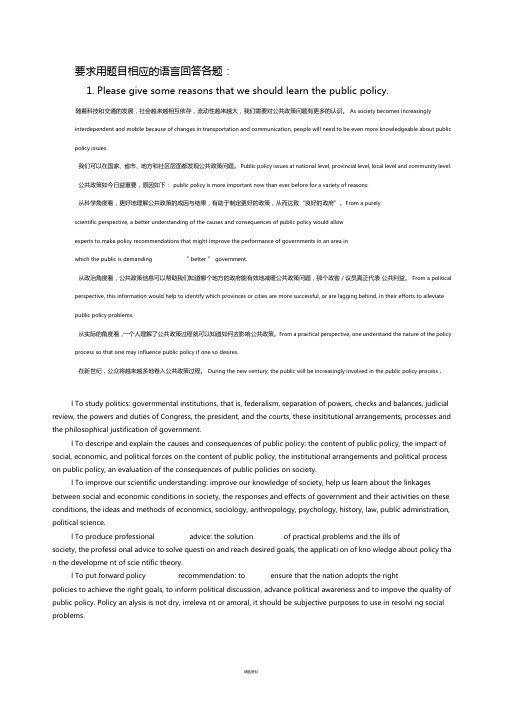
要求用题目相应的语言回答各题:1. Please give some reasons that we should learn the public policy.随着科技和交通的发展,社会越来越相互依存,流动性越来越大,我们需要对公共政策问题有更多的认识。
As society becomes increasinglyinterdependent and mobile because of changes in transportation and communication, people will need to be even more knowledgeable about public policy issues.我们可以在国家、省市、地方和社区层面都发现公共政策问题。
Public policy issues at national level, provincial level, local level and community level.公共政策如今日益重要,原因如下:public policy is more important now than ever before for a variety of reasons:从科学角度看,更好地理解公共政策的成因与结果,有助于制定更好的政策,从而达致“良好的政府”。
From a purelyscientific perspective, a better understanding of the causes and consequences of public policy would allowexperts to make policy recommendations that might improve the performance of governments in an area inwhich the public is demanding “ better ” government.从政治角度看,公共政策信息可以帮助我们知道哪个地方的政府能有效地减缓公共政策问题,那个政客/ 议员真正代表公共利益。
公共政策学-政策分析的理论方法和技术课程设计

公共政策学-政策分析的理论方法和技术课程设计一、课程简介本课程旨在让学生掌握公共政策分析的理论方法和技术,包括政策问题识别、政策制定过程、政策方案评估等方面的知识和技能。
通过本课程的学习,学生将能够更好地理解和应用公共政策分析的方法和技术,建立系统的政策分析框架,提升在政策领域的专业素养和实践能力。
二、课程设置1.政策分析的基本理论和方法本模块将介绍政策分析的基本理论和方法,包括政策分析的定义、目的、流程和方法,以及从政策识别、制定、实施到评价的全过程。
2.政策分析的实践技术本模块将介绍政策分析的实践技术,包括政策文本分析、政策网络分析、政策模拟实验等方法和技术,以及如何应用这些实践技术解决具体的政策问题。
3.政策分析案例分析本模块将通过国内外的政策案例分析,探讨如何应用政策分析的理论和技术解决实际政策问题,加深对于政策分析的理解和应用。
4.政策分析项目实践本模块将组织学生参与政策分析项目实践,分析和解决具体的政策问题,以提升学生在政策分析实践方面的能力和水平,提高其在实践中应用政策分析的能力。
三、课程教学方法本课程采用多种教学方法,包括讲授、案例分析、小组讨论、项目实践等,旨在达到理论与实践相结合的教学目标。
其中,小组讨论和项目实践将是本课程的重点和难点,要求学生积极参与,提高自主学习能力和团队协作能力。
四、课程评估本课程的评估方式包括作业、讨论、报告和项目实践等多个环节,以综合考察学生在政策分析理论和实践方面的掌握程度和能力水平。
其中,项目实践占据较大的比例,要求学生结合实际政策问题,通过政策分析的理论和技术解决问题,展示出政策分析方面的实践能力和水平。
五、参考书目1.Hu, J. (2017). Understanding Public Policy. China RenminUniversity Press.2.Ye, X. (2019). Introduction to Policy Analysis. PekingUniversity Press.3.Birkland, T. A. (2016). An Introduction to the PolicyProcess. Routledge.4.Hill, M., & Hupe, P. (2019). Implementing Public Policy: AnIntroduction to the Study of Operational Governance. SAGEPublications.5.Shirley, M. M., & Weimer, D. L. (2017). Policy Analysis:Concepts and Practice. Routledge.六、总结公共政策学-政策分析的理论方法和技术课程设计,是一门政策分析方面的理论和实践课程,目的是让学生掌握公共政策分析的理论方法和技术,并将其应用到具体的政策问题解决中。
公共政策学单词
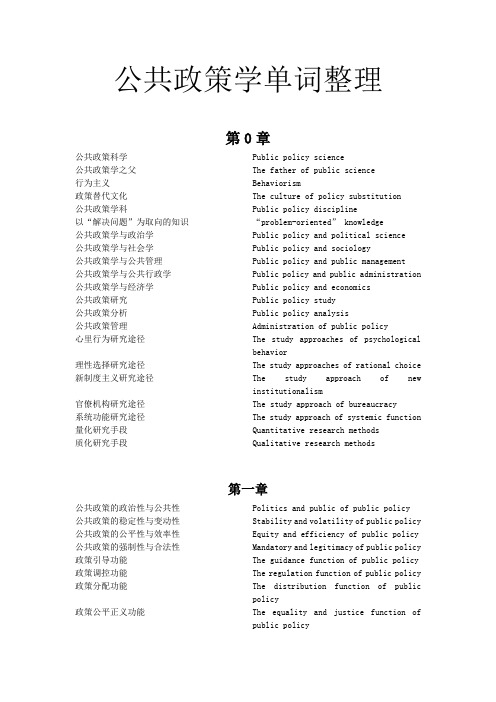
公共政策学单词整理第0章公共政策科学Public policy science公共政策学之父The father of public science行为主义Behaviorism政策替代文化The culture of policy substitution公共政策学科Public policy discipline以“解决问题”为取向的知识“problem-oriented” knowledge公共政策学与政治学Public policy and political science公共政策学与社会学Public policy and sociology公共政策学与公共管理Public policy and public management公共政策学与公共行政学Public policy and public administration 公共政策学与经济学Public policy and economics公共政策研究Public policy study公共政策分析Public policy analysis公共政策管理Administration of public policy心里行为研究途径The study approaches of psychologicalbehavior理性选择研究途径The study approaches of rational choice 新制度主义研究途径The study approach of newinstitutionalism官僚机构研究途径The study approach of bureaucracy系统功能研究途径The study approach of systemic function 量化研究手段Quantitative research methods质化研究手段Qualitative research methods第一章公共政策的政治性与公共性Politics and public of public policy公共政策的稳定性与变动性Stability and volatility of public policy 公共政策的公平性与效率性Equity and efficiency of public policy 公共政策的强制性与合法性Mandatory and legitimacy of public policy 政策引导功能The guidance function of public policy 政策调控功能The regulation function of public policy 政策分配功能The distribution function of publicpolicy政策公平正义功能The equality and justice function ofpublic policy政策变革求新功能The change and innovation function ofpublic policy政策均衡稳定功能The balance and stability function ofpublic policy第二章公共政策主体Public policy actor以个体出面的公共政策主体Public policy subject as individual以组织机构出面的公共政策主体Public policy subject as organization 公共政策制定主体Public policy -making subject公共政策执行主体Public policy implementation subject公共政策评估主体Public policy evaluation subject国家公共法权主体The national and public subject of legalrights社会政治法权主体The social and political subject of legalrights社会非法权主体The social subject of non-legal rights 公共政策问题取向Public policy’s problem orientation公共政策事实取向Public policy’s fact orientation公共政策价值取向Public policy’s value orientation公共政策价值Public policy value公共政策项目价值Public policy’s project value公共政策社会价值Public policy’s social value公共政策意识形态价值Public policy’s ideology value第三章公共政策过程Public policy progress总共政策过程模式The model of public policy progress公共政策议程Public policy agenda实质性议程Substantive agenda象征性议程Symbolic agenda公开的议程Open agenda隐蔽的议程Hidden agenda系统性的议程Systemic agenda制度性的议程Institutional agenda内部推动模式Inside initiation model外部推动模式Outside initiation model社会动员模式Mobilization model公共政策规划Public policy formulation公共政策目标Public policy target公共政策备选方案Public policy alternative集体理性Collective rationality集体思维缺陷Defect of collective thinking公共政策共识Public policy consensus公共政策网络Public policy networks公共政策社群Public policy communities公共政策决策Public policy decision-making理性决策模型Decision-making model of rationality完全理性决策模型Decision-making model of comprehensiverationality有限理性决策模型Decision-making model of boundedrationality渐进决策模型The incremental Decision-making model 子系统决策模型Subsystem decision-making mode公共政策的采纳Public policy adoption公共政策的合法化Public policy legitimization第四章公共政策合法化Public policy legitimization公共政策执行Public policy implementation公共政策执行影响因素Influence factors of public policyimplementation公共政策资源Public policy resource公共政策执行原则The principle of public policyimplementation执行工具选择模式The choice mode of implementationinstrument公共政策执行模型The model of public policy implementation 公共政策评估Public policy evaluation公共政策评估作用The significance of public policyevaluation政策评估模式演变Evolution of the public policy evaluationpattern实证主义政策评估Positivism policy evaluation后实证主义政策评估Post-Positivism policy evaluation测量取向模式Measurement-oriented model目标导向模式Target-oriented model实验模式Experimental model执行评估模式Implementation evaluation mode目标中立评估模式Target neutral evaluation mode回应性评估模式Respondent evaluation mode公共政策评估标准The criterion of public policy evaluation公共政策回应度Public policy responsivity成本-效益分析法Cost-benefit analysis前后对比法Before versus after comparisons公共政策学习Public policy learning第五章公共政策分析Public policy analysis公共政策分析人员Public policy analysts描述性政策分析Descriptive public policy批评-反思性政策分析Criticism-rethinking policy analysis规范性政策分析Normative policy analysis前瞻性政策分析Prospective policy analysis回溯性政策分析Retrospective public policy analysis公共政策分析框架public policy analysis framework公共政策资料public policy data公共政策信息public policy information公共政策知识public policy knowledge公共政策主张public policy claims公共政策分析交流public policy analysis and communication 公共政策文件public policy documents公共政策分析利用public policy analysis and utilization 行政型公共政策分析人员public policy analyst of administrationtype政治型公共政策分析人员Policy analyst of politics type职业型公共政策分析人员public policy analyst of occupation type第六章公共政策问题构建Construction of public policy issue政策问题情境Public policy issue situation政策元问题Policy meta issue实质问题Substantive issue正规问题Formal issue公共政策问题感知Public policy problem sensing公共政策问题搜索public policy problem search公共政策问题界定public policy problem definition公共政策问题明确化public policy problem clearing公共政策问题重新构建public policy problem reconstruction重新解决原问题Problem resolving不解决原问题Problem unsolving结构优良的政策问题Well-structured problem结构适度的政策问题Moderately structured problem结构不良的政策问题Ill-structured problem第三类错误Error of the third type描述性模型Descriptive model规范性模型Normative model口头模型Verbal model符号模型Symbolic model程序模型Procedural model多角度分析Multiple perspective analysis头脑风暴法Brainstorming假设分析法Assumptional analysis类比分析法Analogy analysis类别分析法Calssificational analysis边界分析法Boundary analysis第七章公共政策行动建议Public policy action advice简单的选择模型Simple model of choice复杂的选择模型Complicated model of choice成本收益分析Cost-benefit analysis风险收益分析Risk-benefit analysis成本效益分析Cost-effectiveness analysis推断形式Forms of projections语言形式Forms of predictions猜测形式Forms of forecasts趋势外推Trend extrapolation公共政策工具Public policy instrument公共政策工具选择的传统途径The traditional approach of public policyinstruments choice公共政策工具选择的精制途径The approach of public policy instrumentschoices政策工具选择的制度途径The institutional approach of publicpolicy instruments choice政策工具选择的公共选择途径The public choice approach of publicpolicy instruments choice公共政策工具选择的政策网络途径The policy networks approach of publicpolicy instruments choice自愿性政策工具Voluntary policy instruments强制性政策工具Compulsory policy instruments混合型政策工具Mixed policy instruments目标图形化技术The technique of objectives mapping价值澄清技术The technique of value calification价值评价技术The technique of value critique成本要素构建技术The technique of cost element structuring 敏感性分析技术The technique of sensitivity analysis 合理性分析技术The technique of plausibility analysis第八章基本政策Basic policy具体政策Specific policy规制政策Regulative policy分配政策Distributive policy再分配政策Redistributive policy自律政策Self-discipline policy零和博弈Zero-sum game非零和博弈Non-zero-sum game政策领域Policy field政策结构管理Administration of policy structure政策结构化Policy structure政策群落Policy community政策领域结构Structure of policy field政策形势结构Structure of policy form政治政策群落Political policy community经济政策群落Economic policy community文化政治群落Culture policy community社会政策群落Social policy community政策塔式结构模式Policy mode of tower structure政策链式结构模式Policy mode of chain structure政策圈式结构模式Policy mode of ring structure政策网络结构模式Policy mode of network structure第九章突发事件Emergency crisis unexpectedaccidents社会危机Social crisis危机事件Crisis-issues政府管理的危机Crisis of government administration政府危机Government crisis应急型公共政策Emergency public policy危机决策Crisis decision-making平常决策Usual decision-making危机管理综合模式Comprehensive mode of crisis management全面风险观念Comprehensive risk ideas早期预警Early warning第十章社会转型Social transformation体制转轨System transform政策创新Policy innovation政策移植Policy convergence政策借鉴Policy reference政策替代Policy substitution强制型政策创新Compulsory mode of policy innovation自治型政策创新Autonomous mode of policy innovation回应型政策创新Respondent mode of policy innovation政策创新触发机制The trigger mechanism of policyinnovation政策创新拓展机制The diffusion mechanism of policyinnovation政策创新发展机制He development mechanism of policyinnovation创新型政策传播Innovative public policy。
公共政策单词
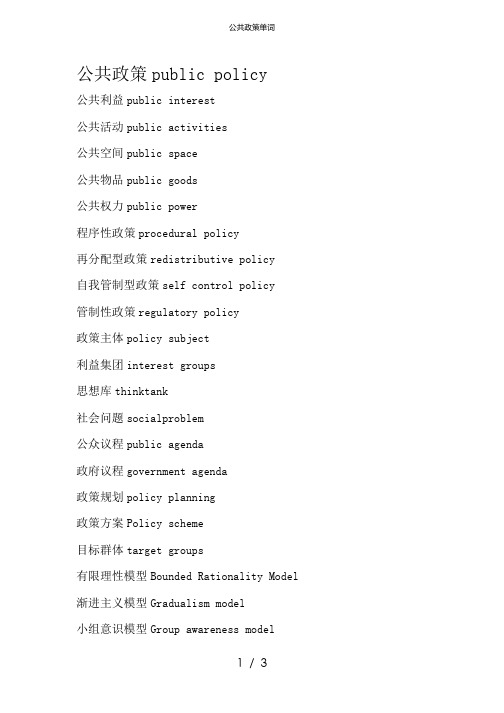
公共政策public policy公共利益public interest公共活动public activities公共空间public space公共物品public goods公共权力public power程序性政策procedural policy再分配型政策redistributive policy自我管制型政策self control policy管制性政策regulatory policy政策主体policy subject利益集团interest groups思想库thinktank社会问题socialproblem公众议程public agenda政府议程government agenda政策规划policy planning政策方案Policy scheme目标群体target groups有限理性模型Bounded Rationality Model 渐进主义模型Gradualism model小组意识模型Group awareness model精英理论elite theory制度理论institutional theory博弈理论game theory团体理论Group theory过程模型Process Model价值判断value judgment政策执行policy implementation钓鱼执法entrapment阶梯效应staircase effect破窗效应Broken windows theory政策评估policy evaluation非正式评估unofficial evaluation预测性评估Predictive evaluation帕累托最优Pareto Optimality成本-收益分析Cost-benefit analysis 政策终结policy termination全体一致原则unanimity rule多数决定规则majority rule等级决定原则hierarchy rule光环效应Halo Effect从众效应Bandwagon effect黄灯效应yellow light effect政策合法性policy legitimacy政策听证Policy hearing政策议题Policy issue政策讨论 Policy discussion政策论证 Policy argument政策建议Policy advocacy政策制定 Policy making效益 effectiveness 效率 efficiency 效果 effect政策分析 Policy analysis法治 rule of law法制 rule by law议程设置 Agenda setting公正 Justice立法 Legislation政策输出 Policy output政策影响 Policy impact 邻避效应 not-in-my-backyard公地悲剧 tragedy of the commons囚徒困境 prisoner’s dilemma搭便车 free rider手段与目标 means-ends无差异不作选择,无选择不作决定No difference,no choice. Nochoice, no decision-making.公平equity 平等equality。
戴伊-理解公共政策简介

Policy analysis involves
1. A concern with explanation rather than presumption 2. A rigorous search of the causes and consequences of public policy 3. An effort to develop test general propositions about the causes and consequences of public policy and to accumulate reliable findings of general relevance.
D. Elite Theory
- People are apathetic and ill-informed, therefore elite shapes mass opinion - Implies that public policy does not truly reflect the wants to the people as much as the elites - Elitism views masses as passive and easily manipulated
-it cannot solve value conflicts -policy analysis is one activity for which there can be no fixed programs
Chap 2: Models of Politics
1. Models of Politics - used to simplify, identify certain aspects, understand and explstudies incorporate the ideas and methods of economics, sociology, anthropology, psycology, history, law and public administration -public policy can be studied for political purposes to ensure that the nation adopts the "right" policies to achieve the "right" goals -policy analysis is finding out what governments do, why they do it and what difference, if anything it makes -learning about the consequences of public policy is often referred to as policy evaluation
双解政策英语作文
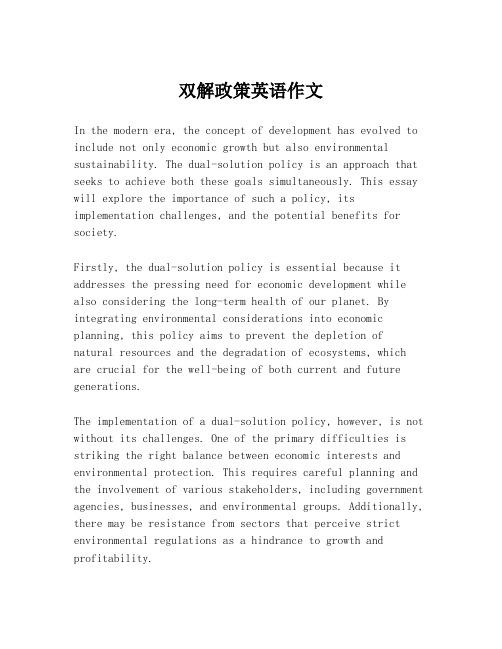
双解政策英语作文In the modern era, the concept of development has evolved to include not only economic growth but also environmental sustainability. The dual-solution policy is an approach that seeks to achieve both these goals simultaneously. This essay will explore the importance of such a policy, its implementation challenges, and the potential benefits for society.Firstly, the dual-solution policy is essential because it addresses the pressing need for economic development while also considering the long-term health of our planet. By integrating environmental considerations into economic planning, this policy aims to prevent the depletion ofnatural resources and the degradation of ecosystems, which are crucial for the well-being of both current and future generations.The implementation of a dual-solution policy, however, is not without its challenges. One of the primary difficulties is striking the right balance between economic interests and environmental protection. This requires careful planning and the involvement of various stakeholders, including government agencies, businesses, and environmental groups. Additionally, there may be resistance from sectors that perceive strict environmental regulations as a hindrance to growth and profitability.Despite these challenges, the dual-solution policy offers numerous benefits. It promotes the development of green technologies and renewable energy sources, which can lead to new industries and job opportunities. Moreover, it encourages sustainable practices that can improve public health by reducing pollution and preserving biodiversity.In conclusion, the dual-solution policy is a forward-thinking approach that seeks to reconcile the seemingly conflicting goals of economic development and environmentalsustainability. While its implementation may be complex, the long-term benefits for society and the environment make it a policy worth pursuing. As we move towards a more sustainable future, it is crucial for policymakers to embrace such innovative strategies that can help us meet our needs without compromising the ability of future generations to meet theirs.。
- 1、下载文档前请自行甄别文档内容的完整性,平台不提供额外的编辑、内容补充、找答案等附加服务。
- 2、"仅部分预览"的文档,不可在线预览部分如存在完整性等问题,可反馈申请退款(可完整预览的文档不适用该条件!)。
- 3、如文档侵犯您的权益,请联系客服反馈,我们会尽快为您处理(人工客服工作时间:9:00-18:30)。
Understanding public policy 《理解公共政策》(朱青整理)chapterⅠPolicy analysisP1Definition of policy 公共政策定义i.Public policy is whatever governments choose to do or not to do.公共政策就是政府选择做与选择不做的事情;ii.Public policies may regulate behavior, organize bureaucracies, distribute benefits, or extract taxes-or all things at once.公共政策涉及调节个体行为、构建官僚体系、分配利益、征税、或者同事完成这些事务。
P1-2➢Policy expansion →政策扩张➢Government growth →政府扩大➢The new deal programs devised →罗斯福新政➢The great depression→大萧条➢The national economy →国民经济➢The great society programs →大社会计划➢Economic downturn →经济滑坡➢Regulatory activity →管制活动P3 图示指标What the Federal Government Does联邦政府职能✓Defense——国防✓Social security and Medicare——社会保障和医疗保险✓Interest on the national debt——国债的利息✓Health——卫生保健✓Welfare ——社会福利✓Transportation——交通运输✓Education——教育✓Natural resources and environment——自然资源和环境✓Law enforcement ——执法✓Veterans——退伍军人✓All other——其他What state and local government do 州和地方政府职能✓Education——教育✓Welfare ——社会福利✓Health and hospitals——保健和医疗✓Highways——高速公路✓Police and fire——治安和消防✓Sanitation——卫生✓Prisons ——监狱✓Natural resources and environment——自然资源和环境✓All other ——其他P4✓Dependent variables →因变量✓The independent variables →自变量✓Determinants →决定性因素✓Policy evaluation →政策评估P6The difference between policy analysis and policy advocacy政策分析与政策倡议的差别i.Policy advocacy requires the skillsof rhetoric, persuasion, organization, and activism.政策倡议需要修辞、说服、组织与实践的技巧;ii.Policy analysis encourages scholars and students to attack critical policy issues with the tools of systematic inquiry.政策分析则鼓励学者运用系统研究的工具来探讨重要的政策问题。
Translation →policy analysis involves 政策分析内容i. A primary concern withexplanation rather than prescription.政策分析主要关注的是政策的解释说明而不是提出政策建议;ii. A rigorous search for the causes and consequences of public policies.政策分析探索公共政策的原因和结果;iii.An effort to develop and test general propositions about the causes and consequences of public policy and toaccumulate reliable research findings of general relevance.政策分析还试图发展并检验关于公共政策因果的一般性命题,以及积累具有普遍意义的、可靠的研究成果。
P7-8The limitations of policy analysis公共政策的局限性➢Limits on government power ——政府权力的有限性➢Disagreement over the problem ——社会问题认定上的分歧➢Subjectivity in interpretation ——政策解释的主观性➢Limitations on design of human research ——人类研究设计的局限性➢Complexity of human behavior ——人类行为的复杂性Translation →Understanding public policy is both an art and a craft. It is an art because it requires insight, creativity, and imagination in identifying societal problems and describing them, in devising public policies that might alleviate them, and them in finding out whether these policies end up making things better or worse.公共政策分析既是一门艺术,也是一种技术。
说它是一门艺术,是因为在社会问题确认、社会问题描述、政策方案设计和政策效果评估时,需要有洞察力、创造力和想象力。
Chapter 2 Models of politicsP11Definition of models for policy analysis 政策分析模型的定义A model is a simplified representation of some aspect of some aspect of the real world.模型是对现实世界某个方面进行简化的表现形式。
➢Conceptual models/word models 概念性的模型➢Actual physical representation 真实物质表型形式Uses of models 模型的运用i.Simplify and clarify our thinking about politics and public policy简化并澄清我们对政治和公共政策的思考ii.Identify important aspects of policy problems识别政策问题的重要方面iii.Help us to communicate with each other by focusing on essential features of political life通过关注政治生活的主要特征,促进我们相互之间的沟通iv.Direct our efforts to understand public policy better by suggesting what is important and what is unimportant指导我们更好地理解公共政策,鉴别重要与不重要的方面v.Suggest explanations for public policy and predict its consequences解释公共政策并预测其结果Selected policy models➢Institutional model(制度主义模型)➢Process model (过程模型)➢Rational model (理性主义模型)➢Incremental model(渐进主义模型)➢Group model (团体理论模型)➢Elite model (精英模型)➢Public choice model(公共选择模型)➢Game theory model(博弈论模型)P14The policy process 政策过程i.Problem identification [问题确认] ——The identification of policy problems throughdemand from individuals and groups for government action.ii.Agenda setting [议程设定] ——Focusing the attention of the mass media and public officials on specific public problems to decide what will be decided.iii.Policy formulation [政策形成]——The development of policy proposals by interest groups, White House staff, congressional committees, and think tanks.iv.Policy legitimating [政策合法化] ——The selection and enactment of polices through actions by Congress, the president, and the courts.v.Policy implementation [政策执行] ——The implementation of policies through government bureaucracies, public expenditures, regulations, and other activities of executive agencies. vi.Policy evaluation[政策评估] ——The evaluation of policies by government agencies themselves, outside consultants, the media, and the general public.➢问题确认通过公民对政府行为的要求来确认政策问题;➢议程设定特定的公共问题引起媒体和政府官员的关注,促使其被提上政策议程;➢政策形成由利益集团、白宫官员、国会议员和智囊团提出政策建议;➢政策合法化通过国会、总统和法院的政治活动,选择并制定政策;➢政策执行通过官僚组织、公共支出、行政机构的活动来推动政策实施;➢政策评估由政府机构本身,政策外部的顾问、咨询人员,媒体和公众等来评价政策实施的结果。
